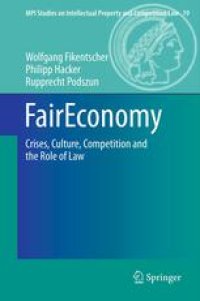
Ebook: FairEconomy: Crises, Culture, Competition and the Role of Law
- Tags: International Economic Law Trade Law, Ethics, Law and Economics, Theories of Law Philosophy of Law Legal History, Philosophy of Law
- Series: MPI Studies on Intellectual Property and Competition Law 19
- Year: 2013
- Publisher: Springer-Verlag Berlin Heidelberg
- Edition: 1
- Language: English
- pdf
FairEconomy is a concept for a free and fair market economy. In response to the financial and economic crises of the past years, the authors develop fundamental ideas of how a market economy works, what rules markets need and who safeguards fairness and equal opportunity in such an economy. The book sets out the design of a sustainable market order: Going back to the very roots of doing business it offers a fascinating insight into the cultural and anthropological premises of the market economy. Fairness and free competition can be identified as key elements of successful markets, sometimes neglected in politics and business. Legal rules need to ensure that fairness and economic freedom work. The same holds true for the relationship of risk and liability that has been overlooked in the banking sector. The ideas of a FairEconomy, sketched in this book, are fit to become a reality: The authors point to institutions and mechanisms that could integrate the concept into global law. They place their trust less upon ever-larger institutions and more on private entitlement and enforcement at the global, regional, and local levels.
FairEconomy is a concept for a free and fair market economy. In response to the financial and economic crises of the past years, the authors develop fundamental ideas of how a market economy works, what rules markets need and who safeguards fairness and equal opportunity in such an economy. The book sets out the design of a sustainable market order: Going back to the very roots of doing business it offers a fascinating insight into the cultural and anthropological premises of the market economy. Fairness and free competition can be identified as key elements of successful markets, sometimes neglected in politics and business. Legal rules need to ensure that fairness and economic freedom work. The same holds true for the relationship of risk and liability that has been overlooked in the banking sector. The ideas of a FairEconomy, sketched in this book, are fit to become a reality: The authors point to institutions and mechanisms that could integrate the concept into global law. They place their trust less upon ever-larger institutions and more on private entitlement and enforcement at the global, regional, and local levels.